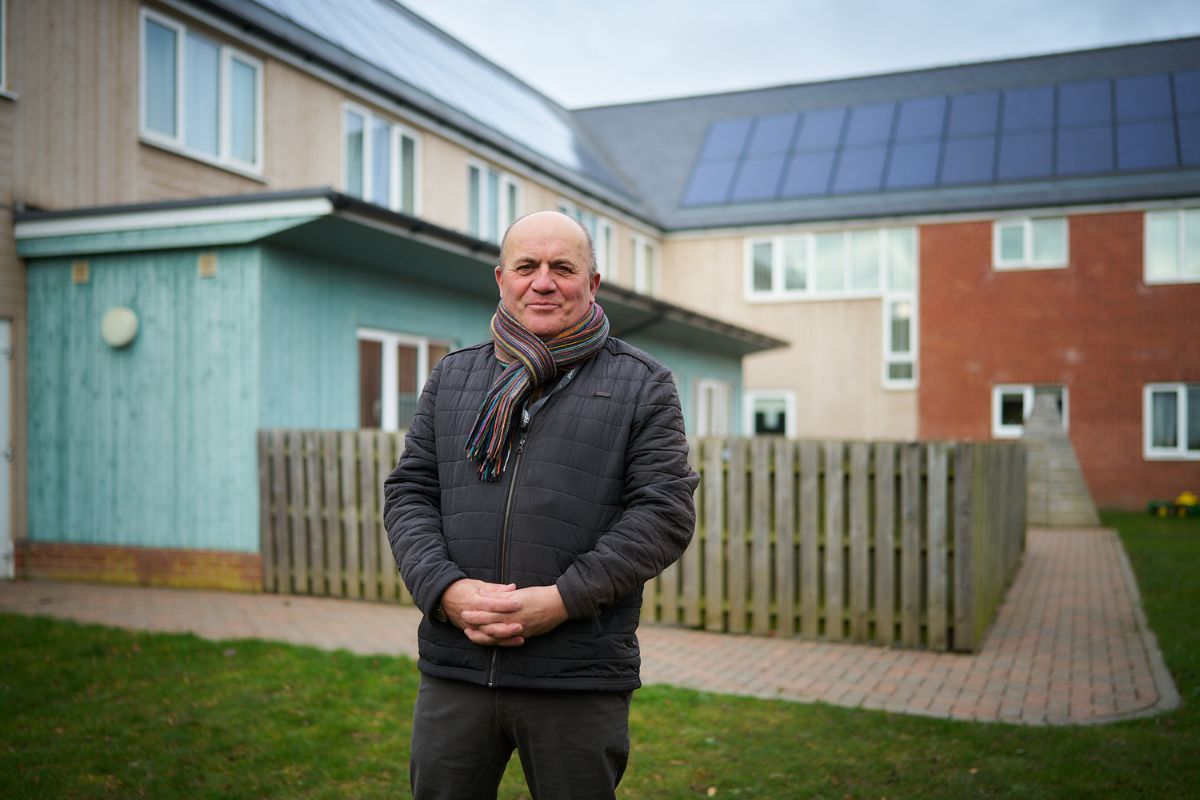Grainia Long, chief executive of the Northern Ireland Housing Executive
The new chief executive of the Northern Ireland Housing Executive, Grainia Long is passionate about the role housing can play in reducing emissions, and how Northern Ireland’s largest social housing provider can play its part in the transition to Net Zero emissions. Here, she outlines the latest research from the organisation, in its role as the Home Energy Conservation Agency for Northern Ireland and plots a course for future action as we #UnlockNetZero.
Eight months to go. Eight months until the largest international conference of its kind descends on Glasgow, and global decision makers agree the next set of milestones to avert catastrophic climate impacts for the planet, and its people. COP26 is genuinely a moment in which choices will be made with far reaching consequences for housing. The UK government has a choice; to put the decarbonisation of buildings and energy systems at the center of its strategy to net zero, or to delay that decision. If it does the former, it will significantly increase the chances of meeting net zero emissions targets by 2050, by investing in industries that have the technology, the capacity and the social innovation necessary. In addition, by investing in the decarbonisation of buildings, it could trigger a once in a generation opportunity to improve housing standards, reduce energy costs of households and create jobs. What a lever for sustainable growth, as we emerge from Covid-19.
I’m not naïve about the cost, or the huge delivery challenges. Data available from my own organisation, speaks volumes about the task ahead. Each Spring, the Housing Executive releases an annual progress report examining energy efficiency and carbon reduction across all of Northern Ireland’s 800,000 houses – around 10% of which are in the organisation’s portfolio.
This year features research commissioned from the Building Research Establishment, Cost of carbon savings in Northern Ireland’s housing stock focusing on the cost and carbon savings of retrofitting all local homes, as we get ready to #UnlockNetZero.
With 85,000 homes we are the biggest landlord in Northern Ireland and also the Home Energy Conservation Authority so the findings will help make the economic case for retrofitting of homes, at scale, across the region.
Research like this helps us determine several things.
Firstly, the scale and the nature of future capital costs; secondly, possible savings per-household on energy bills; and thirdly, the estimated carbon savings of retrofitting our total housing stock to provide better levels of thermal efficiency over both the medium and longer term.
On capital costs, we estimate somewhere between £9bn and £13bn will have to be spent in the longer term. While these are huge sums, they, achieving direct savings of £409m in total for local householders, and the numbers are even greater when the economics of decarbonisation are considered. Several recent studies have demonstrated at a local and national level, that investment in retrofit of homes can generate sustainable growth for city regions and national economies*. For individual households in NI, around £700 per year will see its way back into the pockets of homeowners and tenants alike as a result of this investment.
In terms of carbon savings, this action will eliminate 2.2 million tonnes of carbon locally – a hugely significant reduction in Northern Ireland’s greenhouse gas emissions.
Based on 2018 statistics, we currently produce 13.1 million tonnes of carbon annually and this new research demonstrates that changes to our housing will significantly reduce our carbon footprint.
Costs are significant, particularly in comparison to current spending, but this research comes after the Committee of Climate Change stated, in their sixth Carbon Budget in December 2020, that - across all sectors - Northern Ireland will have to spend around £2.5Bn annually from the 2030’s to mitigate and adapt to climate change.
The Committee also stated that Northern Ireland will have to reduce our carbon footprint by 60% of the 1990 baseline in the next 15 years.
Currently, emissions have only been reduced by 22% of the 1990 baseline, again according to the 2018 data.
Whatever way we look at it, a step change in the scale and delivery of energy efficiency measures is essential across both the public and private sector and this research will inform the debate around the scale of change and the de-carbonisation of the our housing sector. So, while government may have a choice about when we start the work, there is little choice about what we have to achieve. And the sooner we start, the more likely we are to succeed.
Recently, the NI Department for the Economy, which is responsible for our energy policy, produced a report which chimes with our research findings.
Titled Research into the Future of Energy Efficiency Policy in Northern Ireland, the report states that; “In order to align with 2050 net zero commitments, it is estimated that policies would need to drive an annual peak of retrofits for over 50,000 buildings within the next decade. It also offered a current comparison, stating that; “Energy efficiency programmes in Northern Ireland deliver measures for approximately 16,500 buildings per year”. Therefore, current activity needs to be at least doubled, if not trebled, if we are to plot a successful course to #UnlockNetZero.
Future options for the forthcoming NI Energy Strategy are being considered by the Department for the Economy and we acknowledge the widespread consultation carried out with the public and stakeholders to arrive at the future energy options.
The research carried out by the Housing Executive and the Building Research Establishment is predicated on energy efficiency and decarbonized heating scenarios to encompass current thinking and possible future policy considerations to improving all of our housing stock.
We believe future zero carbon heating solutions will be aligned to a variety of options, dependent on whether local houses are connected to the existing natural gas grid.
Readers from outside Northern Ireland might be surprised to find that 68% of NI households still use home heating oil as their primary heating source and the, relatively new, natural gas network services only 25% of dwellings.
Potentially, this network could be extended to reach up to 550,000 dwellings.
We’re currently focused on trialling the electrification of heating to housing not connected to the natural gas grid and assessing the ambition of green hydrogen to succeed on the natural gas network.
As highlighted by the Committee of Climate Change, the development of future heating networks, especially within an urban new build environment, should prove a credible solution.
However, this also needs to be trialed, which should involve a wide range of stakeholders.
Later this year, we’ll publish the findings of our initial low carbon heating pilot programmes and our future ambitions assessing the inclusion of improved energy efficiency measures, including low carbon heating and trialing agile energy tariff models within social housing, to assess both carbon savings and householder energy costs.
The numbers on the decarbonisation of housing speak for themselves ;eye-wateringly large sums of capital investment are needed to make our housing stock fit for the future, climate resilient and delivering reduced emissions. But the social and economic effects of this investment will be long-lasting, will create jobs and enable innovation to drive real change across the industry. Most importantly, it will reduce fuel poverty, improve our energy resilience and improve our chances of addressing climate change. As housing professionals, we must spend the lead up to COP26 demonstrating that the industry is ready to deliver; if we do, we could spend the next thirty years transforming our housing stock the prize is a transformed housing stock, healthier households and homes that are genuinely fit for the future.
*Gouldson, A., Sudament, A., Boyd, J., Williamson, R., Barry, J., and Slevin, A. (2020) A Net-Zero Carbon Roadmap for Belfast, Belfast Climate Commission/Place Based Climate Action Network



